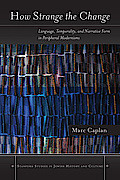Neuerscheinung: How Strange the Change. Von Marc Caplan
24. November 2011
Language, Temporality, and Narrative Form in Peripheral Modernisms. Stanford: Stanford University Press, 2011.
In this book, Marc Caplan argues that the literatures of ostensibly marginal modern cultures are key to understanding modernism. Caplan undertakes an unprecedented comparison of nineteenth-century Yiddish literature and twentieth-century Anglophone and Francophone African literature and reveals unexpected similarities between them. These literatures were created under imperial regimes that brought with them processes of modernization that were already well advanced elsewhere. Yiddish and African writers reacted to the liberating potential of modernity and the burdens of imperial authority by choosing similar narrative genres, typically reminiscent of early-modern European literatures: the picaresque, the pseudo-autobiography, satire, and the Bildungsroman. Both display analogous anxieties toward language, caught as they were between imperial, "global" languages and stigmatized native vernaculars, and between traditions of writing and orality.
Through comparative readings […] Caplan demonstrates that these literatures' "belated" relationship to modernization suggests their potential to anticipate subsequent crises in the modernity and post-modernity of metropolitan cultures. This, in turn, leads him to propose a new theoretical model, peripheral modernism, which incorporates both a new understanding of "periphery" and "center" in modernity and a new methodology for comparative literary criticism and theory. (Verlag)
Prof. Marc Caplan ist Assistant Professor für germanische und romanische Sprachen sowie Tandetnik Professor für Jiddische Literatur, Sprache und Kultur an der Johns Hopkins Universität Baltimore. 2009 war er Kollegiat des Kulturwissenschaftlichen Kollegs Konstanz.
